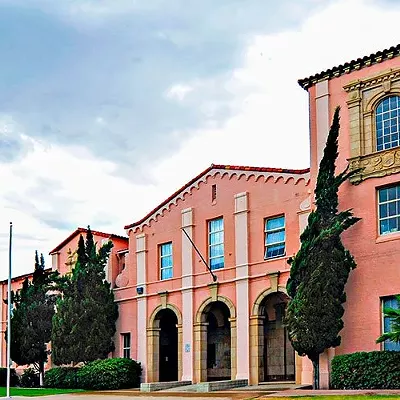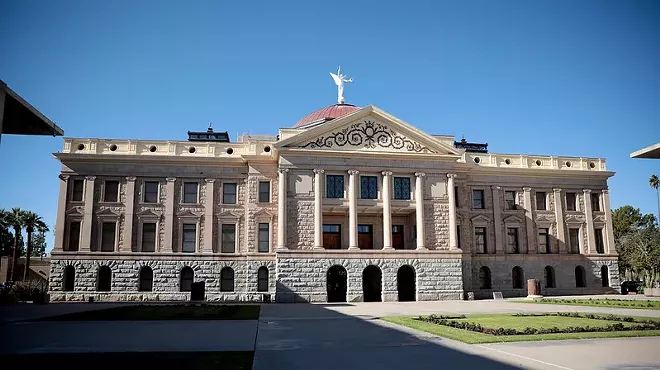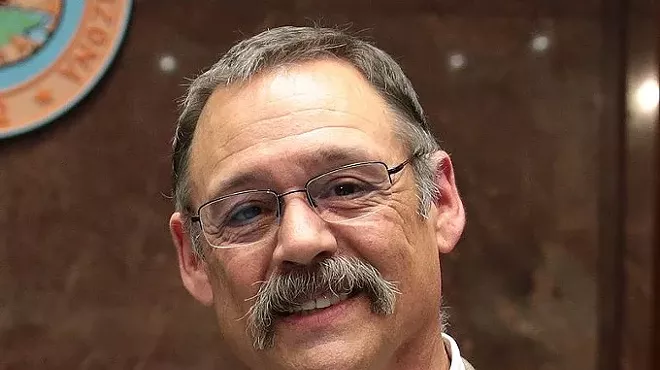Monday, August 22, 2011
Stegeman's Defense: 'I Believe That I Have Done Some Good as President of the Board'
Tucson Unified School District governing board president Mark Stegeman e-mailed a (really long) constituent letter out today discussing everything from board meetings to Mexican American Studies:
August 21, 2011
Dear correspondents and supporters,
My first constituent letter, last September, covered numerous issues important to TUSD. The May and June letters were much narrower: they focused on only the politically consuming issue of the moment, the Mexican-American Studies (MAS) program. The MAS program represents only a tiny fraction of what TUSD does, but it was generating most of the political attention, most of the news coverage, and most of the email.
Much of this letter reflects, somewhat similarly, events of just the last two weeks, which will count for little in the long run history of TUSD. Yet it seems appropriate to respond to the issues of the day.
I expect that the next letter (whenever it comes) will return to the pattern originally intended, which is to emphasize the events which have the greatest long term significance for TUSD.
Since the state (Tom Horne and the legislature) began focusing on the MAS program, its history has unfolded somewhat in the style of an Elizabethan tragedy, according to an internal logic which despite the struggles of the protagonists cannot be avoided. The final acts are not yet written, but the waning of the issue, after years of drama, will be a relief to the district as it tacks toward normalcy.This letter covers these topics:
* The opening day assembly.
* Recent transportation issues.
* Video live-streaming of board meetings.
* Mexican-American Studies (part 3: update and underlying issues).
* Public participation and the audience call of August 9 (including a partial transcript).
* Board leadership issue and the agenda committee meeting on August 11.
* Appendix: four possible principles to guide the teaching of ethnic studies, etc.As usual, I write as only one member of the board (not representing the board as a whole), and nothing in the letter is confidential. Of course, I am happy to hear about any factual errors.
The opening day assembly on August 10.
On August 10 the district invited thousands of employees to an event celebrating the beginning of the new school year, at the Tucson Convention Center. Students provided musical performances and the speakers included Ron Barber, Lisa Lovallo, Michael Duran, and the superintendent. The event was funded entirely by private sources and I thought it worked well.
A major theme was restoring TUSD to its former excellent reputation. I surely agree with that. People constantly ask me whether the district is getting better and can be fixed, and my answer is essentially: yes, things are improving incrementally, but big ships turn slowly. I remain confident that TUSD can become an outstanding district, and of course it already employs many outstanding persons who do their jobs very well, often under difficult circumstances.
Transportation issues
One of TUSD’s major initiatives for this year was a complete revamping of the bus system, to improve service and reduce costs. The routing problem to be solved was well-understood though slightly different from last year due to several boundary changes, including the addition of one new school. Staff decided many months ago that there was enough time to test and fully implement the new system this year, and they maintained this plan through the summer.
Unfortunately, during the first week of school there were major and widespread problems in bus routing. The Transportation Dept. received so many phone calls that its phone system collapsed on Monday and was down until Thursday, increasing the frustration of persons seeking help. Staff worked hard to solve the various problems and are the best source for more information. They report that routing problems are being resolved.
I commend the superintendent for promptly acknowledging that the magnitude of the bus problems was “completely unacceptable.” TUSD cannot regain public credibility until we are consistently honest about problems as well as successes.
From my viewpoint, TUSD’s historical culture has placed too much emphasis on optimistic presentations and too little emphasis on execution. I hope that this is changing.Video live-streaming of board meetings.
Board member Michael Hicks and I have been pushing for video live-streaming of the board meetings, and this will appear again on the board’s agenda, probably in September. The original rationale was to improve the public record, especially because the board receives much information in visual presentations which the audio recording does not capture.
Another advantage now appears to be equally important. A complete video record will allow the public to get a more balanced and complete view of what happens at TUSD board meetings, instead of the selective and sometimes incorrect accounts which currently circulate. (This comment is directed mainly at the informal online media; the Star is generally accurate in its reporting.)The cost of live-streaming has declined over time, as more and more public bodies adopt it. A competitive bid process is likely to produce a completely outsourced solution for a reasonable monthly fee.
The Mexican-American Studies (MAS) program: update and underlying issues.
My last letter said that I had one more (shorter) letter to write on the MAS issue, which surely has exhausted most persons’ patience. It has correctly been called a distraction. Unfortunately, forces outside TUSD have made it important, my attempt in April to move toward a solution failed, and we are stuck with the controversy for awhile longer.
Since the board’s 4-1 vote on June 17 to appeal the Arizona Department of Education’s (ADE) ruling that the MAS program violates A.R.S. 15-112 (the law created by HB2281), TUSD has focused on preparing for that hearing. It began on August 19 and is scheduled to continue on August 23 and on September 14. After that, the judicial hearing officer will either support or reject TUSD’s appeal, the ADE will respond to that finding, and if the ADE still maintains that the MAS program violates the law then the board will have to decide how to respond.One reason (but not the most important reason) for my vote against TUSD’s appeal was cost. On August 19 alone, TUSD and ADE had altogether at least six attorneys present all day at the hearing, mostly expensive attorneys from outside law firms. During my preceding five-hour deposition, each side had an outside attorney present throughout. Multiply this by many days of depositions and hearings, add a huge amount of attorney preparation time, including the preparation and review of literally thousands of pages of exhibits, and you can see where it leads. (These comments are in no respect meant as a criticism of TUSD’s attorneys, who I assume and believe are litigating the case diligently and professionally.)
The threat hanging over the district is the 10% funding cut which the statute allows ADE to impose on TUSD, for violations of A.R.S. 14-112. Speaking as only one board member, I am unlikely to support any course of action which is likely to lead to that penalty.
The MAS teachers’ lawsuit against the state is an entirely separate action, and I am aware of no recent news concerning that suit. Despite early announcements to the contrary, TUSD was never named as a defendant, and so the district’s role is that of an interested bystander.
The long-standing issues.
My last (June 15) letter concerning MAS was mostly a chronology and a summary of arguments in favor of ethnic studies. I said then that I would write a third and final letter about the issues specific to TUSD’s MAS program. I will cover those issues briefly (briefly in that much more could be written) here.
Because my views are often misrepresented, it seems important to emphasize again that I have never opposed the concept of ethnic studies in general or Mexican-American studies in particular, in writing or speaking or in fact. Indeed, my previously published opinion pieces and constituent letters set forth clear arguments for including Mexican-American history and culture, and diverse political perspectives, into our curriculum.
It is also worth emphasizing that there is no apparent conflict between the goals for the MAS program, as expressed in the 1998 board resolution which authorized its creation, and the restrictions imposed by A.R.S. 15-112. The exaggerated political conflict over MAS arises, therefore, mostly from TUSD’s particular implementation of the 1998 resolution and external perceptions of that implementation.
Here is a brief summary of the ongoing issues surrounding MAS, staying mostly away from the particular issues raised by A.R.S. 15-112.
Curriculum approval and board oversight.
After ADE’s external audit report (from Cambium) failed to find violations of A.R.S. 15-112, ADE’s June 15 finding emphasized a different issue: TUSD’s failure to provide adequate review, approval, and oversight of the MAS curriculum.
I recently asked TUSD’s board office to research the history of board actions concerning MAS. After the 1998 resolution authorizing the creation of the program, this history proves to be very thin. As far as I can see, the board never saw detailed curriculum plans or course materials, and it never even approved the course titles. Its main actions were to approve texts which it never reviewed, in long lists which combined many curriculum areas, and occasionally to approve resolutions expressing support for the program.
Someone closely connected to the passage of the 1998 resolution, and who supported it strongly, recently told me that he or she never expected the MAS program to evolve into its current state.
An external review of all four of TUSD’s ethnic studies was conducted in 2006, but I am not even sure whether the 2006 board received a copy of the report (which included varying criticisms of the four programs).
After receiving this information from the board office, in late spring, my viewpoint toward the MAS program changed. Because the process which created it seemed so procedurally incomplete, I decided that it was best simply to end the current program and start over, following proper procedures. This was the major reason for my vote against TUSD’s current appeal.
In a redesigned MAS program, I would not support the recreation of an extensive independent MAS curriculum. (I can imagine reasonable arguments for, say, one course in Mexican-American art and one course in Mexican-American literature, but there has yet been little discussion of the structure of a redesigned program.) I think it generally makes more sense to integrate Mexican-American history and culture into the standard core curriculum, which every student takes. This integrated curriculum would presumably include some, but not all, of the current MAS curriculum.
Student achievement.The district has for years claimed that students who enroll in MAS courses perform better than average academically, usually as measured by AIMS scores or graduation rates. Some of the early claims seem to have been withdrawn, but during 2011 TUSD’s research department produced credible and detailed data which lend support to the achievement claim.
Economics, as an academic discipline, emphasizes sophisticated statistical analysis of data and causal relationships. Therefore, in my paid capacity as an economics professor at UA, I have been very interested in TUSD’s claims about MAS. (My specialty is theoretical economics, meaning a focus on mathematical modeling rather than on data analysis, but economists get substantial training in both areas.)
My view of the data which TUSD has produced is that it is what economists might call suggestive but inconclusive. This means that there is enough to suggest that positive achievement effects exist, but the current data and analysis would be insufficient to publish that conclusion in a peer-reviewed economics journal.One problem is that, as far as I know, there has been no attempt to prove that the achievement effects are statistically significant, and any serious effort to do so would require a study much more ambitious than anything done so far. Ideally, it would use much more data, but constructing a big data set seems impossible because TUSD’s MAS program is almost unique. Despite national prominence for many years (e.g. in conferences and publications) , no other Arizona school districts and very few districts nationally have chosen to create programs even roughly similar to TUSD’s MAS program.
Another concern is that many things could cause correlations between academic performance and taking MAS courses, and the district’s analysis to this point has used few control variables to isolate those effects. To see how this can cause problems, suppose that MAS instructors successfully recruit students who are likely to outperform others, within a relevant pool of students. If the control variables do not capture the student characteristics which predict superior performance , then an observed relationship between MAS courses and academic performance may not be causal.
Another issue is class size. In an earlier letter, I stated that MAS classes, in the academic year 2009-2010, were about half the size of the core classes for which they substitute; this was based on staff’s best estimates at the time. This later proved to be incorrect, and I am sorry to have reported faulty information. More complete data show that MAS classes are generally smaller than the comparable core classes, but the difference is less extreme. It is more accurate to say that enrollment in a MAS class is typically 75%-80% of the enrollment in a comparable class. This varies, of course, from school to school and year to year, etc.
An ideal statistical analysis would control for differences in class size, and it would also follow individual students as they matriculate through high school instead of aggregating data across all students. It is hard to predict what such an analysis would find, but the correlations in the district’s data are strong enough that I think there would be a reasonable chance of finding a statistically significant causal relationship between taking MAS courses and academic performance.
There is no doubt, from student and parent testimony, that MAS courses have greatly helped particular students, increasing both their interest in school and their grades.Political balance and activism.
My primary personal concern with the MAS program, since before I joined the TUSD board, has been lack of political balance. A related concern is whether the program aggressively promotes student activism in favor of certain causes.
As an educator, I think it is important to expose students to a wide range of viewpoints, including viewpoints which seem extreme (students get exposed to those viewpoints anyway, in the current political environment), but that this should be done with objectivity and detachment, to the extent possible. I am concerned when we take advantage of our position as educators to push particular viewpoints rather than merely helping students to think critically about issues.
A few weeks ago the superintendent tried to organize a balanced forum on the MAS issue, but these efforts were reportedly stymied by MAS supporters, who did not cooperate and instead organized several public forums at which all of the speakers were strong supporters of status quo MAS. (I attended the June 1 forum and understand that this was true also for the MAS-affiliated events later in June and July.) From what I can see, presenting both sides of an issue and encouraging balanced debate or dialectic between them does not appear to be the routine practice of MAS staff.
My concerns for balance apply to the entire TUSD curriculum. I recently voted against an economics textbook adoption because, as I stated publicly, I felt that the book goes too far in promoting a conservative agenda on policy issues.
As I have learned more about the MAS program, since the start of the year, I have also become increasingly concerned about encouragement or even pressure on students to engage in political activism, for specific kinds of political causes. As educators, we should be caregivers for our students. I have been startled, therefore, to see MAS staff and other adult supporters of the program celebrate and thus indirectly encourage MAS students to take actions, including potentially illegal actions, which put the students at risk.
The issues of political balance and activism differ from the issues raised by A.R.S. 15-112, but they are loosely related, and so I prefer to write little more on this issue while TUSD is in an adversarial legal process with the state. My testimony under oath at Friday’s hearing, as a witness called by the state (and subject to subpoena if I refused), placed me in the awkward position of providing evidence which could ultimately reduce TUSD’s funding. This obviously sits uncomfortably with my fiduciary responsibilities to the district.
Parts of my testimony have been widely reported, such as the remark in my notes, taken during a classroom visit (and never intended for anyone but myself), that “This is a cult” and my opinion that the aggregate patterns of behavior observed during the past few months fit some of the patterns described by Eric Hoffer in The True Believer more closely than what one would typically expect from teaching and advocacy in the K-12 context. I am reluctant, however, to add anything here to my testimony under oath. Indeed, nothing in this paraphrasing should, in any respect, be construed as adding to or amending that testimony.
Administrative costs.
Separate from any classroom issues, the MAS program has high administrative costs. Some staff members travel frequently, and for many years the MAS department annually sponsored an expensive summer conference on MAS curriculum. According to staff, the cost of the 2010 summer conference exceeded $200,000. Readers who have experience organizing conferences will recognize how expensive this is. The district did not fund the conference this year.
The total annual budget of the MAS program, including not only its regular budget but supplemental appropriations, has been (according to staff) slightly over $1 million per year.
The number of students served.Inadequate student achievement is the most important problem facing TUSD, and the achievement gap between Latino students and the rest of the TUSD student population is an important part of that problem.
The small size of the MAS program means that it can have only a very limited effect on TUSD’s achievement gap. At last count, TUSD has over 30,000 Latino students, but enrollment in the MAS classes has been declining for several years, and for the semester which just started only 375 TUSD high school students registered for any MAS courses. (According to staff, this is not due to reduced course offerings: 20-25 MAS courses are offered in TUSD high schools each semester.) Even at Tucson High School, where the MAS program is largest and strongest, most Latino students never choose to take a MAS course.
TUSD’s other ethnic studies programs emphasize counseling and academic intervention for individual students. The MAS program provides few services of this kind, and this has helped to limit its impact.Adequate coverage of core material.
Some persons, including me, have questioned whether the MAS courses introduce so much additional material that they sacrifice adequate coverage of the state’s core material. Some anecdotal evidence supports this concern, but it is fragmentary. The question seems more acute in the social studies core, because the state’s social studies requirements are extensive.
On paper, the MAS courses do provide adequate core coverage, but the board has never received any information which provides clear evidence on actual practice, one way or the other. I think that is partly because it has been difficult for district staff to obtain exams and other information which could provide better information about what happens in the MAS classrooms. (The same could probably be said for much of TUSD’s core curriculum, not just MAS.) The Cambium audit supported the MAS courses on this issue, but given the brevity of the auditors’ visit it is hard to know how much weight to put on that conclusion.
In short, this question remains unresolved (in my opinion).
Whether content is age-appropriate (especially for elementary students).
On May 10, the last speaker during the audience call read startling passages from the book Message to Aztlan, which staff later confirmed had been approved for students as young as third graders. Almost everyone seems to agree that at least parts of this book are inappropriate for third grade. This applies also to some other materials approved by past boards or administrations for MAS teaching in elementary grades.
Obviously the district should revisit and rescind some approvals.
It is not clear, however, whether TUSD elementary students have actually had much exposure to the questionable materials. (At least, it is not clear to me.) Therefore, whether the use of age-inappropriate materials is a real or merely a hypothetical problem also seems unresolved.Most of the information which the board has received about the MAS program concerns the high school courses, which are the biggest part of the program. I feel generally poorly informed about the elementary and middle school parts of MAS.
The audience call on August 9; and general issues concerning public participation in board meetings.
TUSD board meetings have long attracted strong speech and protest, but this has recently risen to higher and sometimes nearly unmanageable levels because of the deeply polarized views on the MAS program.
The inappropriate speech of one speaker at the August 9 board meeting caused controversy; so this may be a good time to step back and consider the general issues surrounding audience speech. If you are not even aware of this incident, then you may want to skip much of this section.
It is common to exhibit selective concerns about free speech. For many of us, aggressive speech seems heroic when it supports our position but awful when it comes from the other side. This can lead, subconsciously or unintentionally, to inconsistent standards. Such inconsistencies extend to security issues: persons who object to police action against their partisans are sometimes the first to ask for police control of partisans from the other side.
As the moderator of the public conversation at board meetings, I try to treat all sides fairly. I do not claim to have always succeeded, but I think that the treatment of speakers on the issue of MAS has been generally equitable. I expect that most persons, if they saw all of the audience call time and not just the few segments which get posted, would agree. (We are not yet making video recordings, as discussed above, but audio recordings of board meetings are posted on the district website.)
It has been my practice to warn a speaker who crosses the line, whatever that means in the specific case. If the speaker ignores the warning then the superintendent or I can take stronger action, up to removing the speaker from the room.On August 9, an audience speaker John White crossed the line when he criticized a board member’s father. After some disorderly discussion, I warned him to stop making personal comments and he did so. (A partial transcript is below.) Mr. White’s remarks stayed within the usual three-minute time limit and he stopped when he received the signal to stop.
Setting aside the personal references, much of Mr. White’s other speech was unpleasant, but the board has heard much unpleasant speech from speakers on both sides of the MAS issue.
Some persons said that Mr. White should have been silenced immediately, but that would have been inconsistent with our recent practice. I have typically issued a warning before silencing a speaker who properly has the floor. Some persons have gone further and argued that Mr. White should have been removed from the room, but if we arrested people without even a warning then we would have been arresting people all year. Few would accept such an oppressive policy.
During the May 3 meeting, when many arrests occurred, the problems were different. Most of the speech was acceptable political speech, but the speakers seized the floor outside of the audience call period (most had not even asked to speak during the audience call) and then refused to yield the floor after warnings. We learned from that experience and would handle it differently now, with the goal of fewer arrests; but if a speaker seriously disrupts a meeting and refuses to stop, then it is still true that at some point they may be escorted from the room. I am sure that the same would happen at the City Council or Board of Supervisors.
Over the past few months, speakers supporting the MAS program have had more time during the audience call than speakers opposing it. That is simply because most of the persons who have signed up to speak on this topic, especially back in the spring, have been supporters.
I have strong views on free speech and have given audience speakers considerable latitude. Several speakers have attacked me personally or spoken very aggressively to the board in general. In most cases, I have treated them more leniently than I treated Mr. White; I have simply allowed them their time to rant.
Clearly, however, most members of the board support tighter limits than I have been imposing, on both sides of the MAS issue. If I remain as president of the board then I will respect their wishes by imposing slightly tighter bounds on audience speech and giving warnings sooner.
Here is the exchange from shortly before the point at which Mr. White first referred to Ms. Grijalva and her father. I include it partly because many inaccurate things have been written about it. The transcript is not exact (the recording is on the district website) because people were interrupting and talking over each other, but it is pretty close:
White: La Raza Study calls for civil war. They want to fight the white man. They want to kill every gringo over the age of 16. I’ve read it in the book... and they’re [the audience] laughing at it. But when I tell you this... when the blood flows, there’s not going to be any timeouts and no white flags. This is a very serious thing, and your father brought it upon himself...Stegeman: Alright, alright, I’m going to ask... Grijalva: Sir, if this is not [unclear] none of this [unclear] is appropriate.
White: Your books are absolutely calling for civil war.
Stegeman: I’m going to ask, first, that the speaker not refer to specific board members...
White: I’m talking about her father.
Stegeman: Well, I’m going to ask...[people talking over each other]
Grijalva: I think this is incredibly disrespectful...White: You bet it is.
Grijalva: and I think he should not have the opportunity to continue...White: He’s a traitor to this great nation.
[At this point ensued uncontrolled discussion, comprising mostly Grijalva debating White about whether White slandered her father, Burns commenting on policy violations, and various persons debating whether White had the right to continue. Eventually the conversation continued as follows.]
Stegeman: Ms. Burns, how much time did he use up? Burns: He used up about a minute and a half.Stegeman: Alright, so I will give you...
[people talking over each other]
Stegeman: If you refrain... I understand the sentiments of the Board members who would like you not to have any more time. If you will refrain from any more personal comments, then I will give you one more minute. If you make any more comments of that nature, about any board member’s relative or anything else, I’ll ask you to sit down. I’ll also ask the rest of the audience to please remain silent for this last minute.
White: [speaks for one more minute, making no personal comments]
It isn’t a pretty picture, and this partial transcript omits Mr. White’s aggressive and ethnically charged speech both before and after the quoted material. In the future, I would call a recess long before the discussion became this hostile or dissolved into similar chaos. This will imply tighter control of speakers on both sides of the MAS issue. It will also require greater self-discipline among or tighter control of board members. A significant fraction of this year’s disorderly conduct in board meetings has occurred on the dais.
There are two final points about this incident: First, shortly before he first referred to Ms. Grijalva, Mr. White briefly made an obscene hand gesture, apparently directed toward the board. It happened so quickly that I was not sure whether it was deliberate; if I had been sure, then I would have warned him immediately. (At least one person on the dias did not even see it.) This is clearly outside any definition of acceptable “speech” during a board meeting.
Second, it has been widely and as far as I know accurately reported that Mr. White attempted to bring a knife with a 6" blade into the board room. The knife carried was legal, and Mr. White voluntarily left it outside when security asked him to do so. If no law was violated then, in my opinion, these circumstances alone should not deprive a person of their right to free speech. Staff is investigating all of the circumstances surrounding this incident and will advise the board about whether there is cause to bar Mr. White from future board meetings.The proposed change in board leadership, initiated on August 11.
After the harmonious atmosphere of the August 10 assembly, I was surprised on August 11 when board clerk Judy Burns and the superintendent voted, in a public meeting of the agenda committee, to place a change in board leadership on the August 23 agenda of the full board. The vote was 2-1. They both stated that other unnamed board members supported the item.
I voted no mainly because Ms. Burns had brought an essentially identical item to the full board in June, and after the board rejected her motion it is unusual to bring a similar item back so quickly. Bringing an item back repeatedly in the hope of finding the right moment to capture a majority is bad precedent and bad practice, and it has rarely occurred since I have been on the board. I said that I would vote against such a quick reconsideration regardless of who was in the board leadership.
I appreciate board member Michael Hicks’s public support on this point.
I first heard of the proposed agenda item early on the morning of August 11. By the time the agenda committee publicly convened at 11:30, the draft agenda for August 23 was already printed and distributed to meeting participants, with the board leadership item listed as action item #7. Ms. Burns was the listed sponsor, but the board clerk, as only one member of the agenda committee, has no power to schedule an item unilaterally.
As far as I know, this sequence of events is unprecedented. Placing a non-routine item into the printed draft agenda has always indicated that either the superintendent has placed the item or the agenda committee has already tentatively agreed on the item. Since the agenda committee had not yet even discussed this item in open session, this creates a bad appearance (at best) in the context of the Open Meeting Law.
I believe that we should change the board’s agenda policy, to remove the superintendent’s vote on the agenda committee. The superintendent has expressed public support for this idea. We agree that it makes little sense for the superintendent to be breaking ties between board members.
If removed as president of the board, then I will have less influence on the agenda but will of course continue to have one vote and to exercise my responsibilities as a board member. I believe that I have done some good as president of the board, including the small but significant change of starting meetings more punctually, but I do not cherish the position.
I have consistently maintained a policy of criticizing neither the superintendent nor other board members, and I continue to believe that this is the best practice for the district’s leadership. It becomes increasingly difficult to sustain this policy, however, when others do not seem to support it.
I have said countless times that TUSD would be stronger if we could consistently focus our conversations on policies and decisions, rather than on personalities. If we spoke solely about schools and how central administration can make the most efficient use of our scarce resources to help our schools and teachers and to strengthen the education they offer, and the pros and cons of various strategies to accomplish that, then the people whom we serve would be better off.
That is all for now, except that I have added a one-page appendix which proposes four principles that might form an acceptable basis for moving forward on ethnic studies. I hope that the next letter will focus on TUSD’s larger and more systemic issues. I will try to write again (and more briefly) soon, but UA starts tomorrow and this makes time even scarcer.
Thanks for your interest,
Mark Stegeman
AppendixOne irony in the MAS debate is that I think there is more agreement among the general public (regardless of ethnicity) on the reasonable role for ethnic studies in K-12 education than on many other currently controversial issues. I expect that most of us in Tucson could endorse or at least accept the following four principles:
1) History courses ought to expose students to a wide range of viewpoints, not only because the interpretation of history is subjective and many viewpoints can be legitimate, but also because it is good intellectual exercise to look at things from different angles and to sort out the differences in the underlying assumptions or reasoning or evidence. There are few better ways to learn critical thinking than to be forced to evaluate and potentially reconcile contradictory (or apparently contradictory) ideas, including the use of evidence to buttress one’s argument.
2) Given where we live and the ethnic composition of our student population, it makes sense to give extra emphasis to Mexican-American and Native American history and viewpoints, more so than would be true elsewhere in the U.S.3) Teachers should show restraint and not use their position of authority to direct students toward particular opinions on controversial political issues. Then students will be better prepared to sort out, for themselves, how they feel about current and future policy debates.
Of course, it is impractical to define perfect objectivity or to require it from teachers, but we can still describe reasonable standards of balance. One such standard is that no student should feel uncomfortable or unwelcome because of their political beliefs.
I think that balance is important even when teaching university students, and it must be doubly so when teaching younger students.
4) To the extent practical, it is good for students of different backgrounds and ethnicities to have a common educational experience and to share that experience together. This shared experience is part of the philosophy of universal public education; it helps to break down misunderstandings, stereotypes, resentments, and discomfort with people who are different from ourselves.
Tags: Mark Stegeman , Michael Hicks , Judy Burns , Adelita Grijalva , Mexican American Studies , Tucson Unified School District














